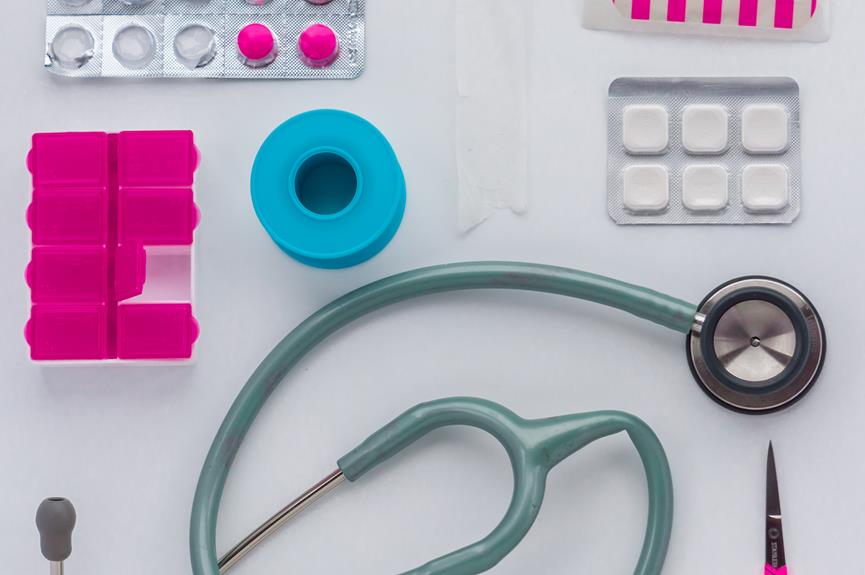Drug & Device Lawsuits
Navigating the treacherous waters of drug and device lawsuits requires a compass of knowledge and understanding. This article serves as that compass, shedding light on the complexities of product liability, the role of legal counsel, the intricacies of class actions and defenses, and the factors influencing settlements. We also delve into landmark verdicts and case studies, providing a comprehensive guide for those embarking on the daunting journey of seeking justice for damages incurred due to defective pharmaceuticals or medical devices.

Key Takeaways
- Filing a drug or device lawsuit can provide compensation for physical, financial, and emotional hardship, ongoing medical treatment costs, loss of companionship, lost wages, and diminished quality of life.
- Lawsuits can be filed due to defects in marketing, design, and manufacturing, including failure-to-warn claims, design defects, and manufacturing defects.
- Hiring a product liability lawyer is recommended due to the complexity of lawsuits against pharmaceutical and medical device companies, as they can explain legal rights and options, evaluate the strength of the claim, and negotiate settlements or take the case to trial.
- Class action lawsuits and multidistrict litigation (MDL) are options for handling large numbers of drug and device injury cases, with lead plaintiffs representing a larger group of injured people and MDL consolidating similar cases with a single judge overseeing them.
Understanding Drug and Device Lawsuits
In navigating the complex landscape of drug and device lawsuits, it is imperative to understand the motivations for filing such a case. Often, individuals seek compensation for physical, emotional, and financial hardship inflicted by defective drugs or medical devices. Potential defects in marketing, design, and manufacturing could constitute grounds for such a lawsuit. Legal implications of drug and device recalls often involve allegations of negligence or failure to warn. The role of the FDA in drug and device lawsuits is crucial as their regulations and approval processes are often central to these cases. Engaging legal representation is important, given the complexity of these cases and the experienced legal teams often employed by pharmaceutical and medical device companies.
The Scope of Compensation in Drug and Device Lawsuits
Assessing the scope of compensation in drug and device lawsuits involves understanding various factors, including the severity of physical injury, emotional distress, and financial hardship, but also takes into account the claimant's age and pre-existing health conditions. The scope of compensation is a critical aspect of these legal proceedings, as it determines the potential restitution for the affected parties. Factors influencing settlement amounts in drug and device lawsuits can range from medical costs and lost income to pain and suffering, and even punitive damages in cases of gross negligence. Each case is unique, and compensation is carefully calculated to ensure it adequately covers the damages sustained. Hence, the scope of compensation is a significant consideration in the pursuit of justice in drug and device lawsuits.
Defects Contributing to Lawsuits: Marketing, Design, and Manufacturing
Pharmaceutical and medical device companies often face lawsuits, which can largely be chalked up to defects in marketing, design, or manufacturing, and these defects can have severe implications for consumers. Marketing defects, such as inadequate instructions or improper labeling, often give rise to failure to warn claims. Consumers allege that they were insufficiently informed about the potential risks or side effects of a drug or device. Design defects render a product inherently dangerous, even if it is manufactured correctly. On the other hand, manufacturing defects occur when a product deviates from its intended design during production, causing it to become harmful. Any of these defects can lead to significant injury, instigating a lawsuit.
Role of a Lawyer in Filing a Drug or Device Lawsuit
Undoubtedly, employing a well-versed lawyer plays a vital role in filing a drug or device lawsuit, providing crucial guidance through the complexities of such legal actions. A lawyer's role extends beyond navigating legal proceedings as they are instrumental in explaining clients' legal rights and options. Lawyers offer invaluable expertise in assessing the strength and potential value of the claim, and their strategic insights can be pivotal in the outcome of the case. Among their key functions is the role of a lawyer in negotiating settlements. They use their skills and knowledge to negotiate with opposing parties, aiming for a fair resolution that adequately compensates for the client's damages. In essence, a lawyer serves as a protector, advocate, and guide, ensuring their client's best interests are upheld throughout the legal process.
The Reality of Class Action Lawsuits in the Pharmaceutical Sector
In the highly complex and specialized landscape of the pharmaceutical sector, thousands of class action lawsuits are filed each year, highlighting a stark reality faced by both industry players and consumers. These lawsuits often stem from allegations of negligence, faulty product design, or misleading marketing tactics. This frequent litigation significantly chips away at public trust, inciting skepticism towards the industry and its products. Regulatory agencies such as the Food and Drug Administration play a pivotal role in these lawsuits, as their approval of drugs and devices is often a primary point of contention. This raises questions about the efficacy of current regulatory standards and procedures, casting a shadow of doubt over the entire sector. The situation underscores the urgent need for increased transparency and stringent regulation to restore public trust.
Multidistrict Litigation: A Closer Look
How, then, does multidistrict litigation function, and why is it an increasingly popular mechanism in drug and device lawsuits? Multidistrict Litigation (MDL) consolidates numerous similar cases from different districts under one federal judge, offering efficiency and uniformity. Unlike Class Action, where a representative stands for all plaintiffs, in MDL, each plaintiff retains their individual lawsuit. This difference, MDL vs Class Action, is crucial when damages vary significantly among plaintiffs. The Pros of Multidistrict Litigation include streamlined pretrial processes and the potential for large settlements. However, the Cons involve potential delays due to the volume of cases and loss of control over individual suits. Despite these, the rise of MDL in drug and device lawsuits reflects its perceived advantages.
Costs and Considerations When Hiring a Lawyer
Navigating the legal landscape of drug and device lawsuits requires both an understanding of the costs associated with hiring a lawyer and careful consideration of various factors before making a decision. Strategies for finding the right lawyer should include researching their experience in drug and device lawsuits, as this expertise is crucial for navigating the complexities of such cases. Additionally, costs should be discussed upfront, with many lawyers operating on a contingency basis, meaning they only receive payment if they win your case. The importance of experience in drug and device lawsuits can't be overstated; a seasoned lawyer will be familiar with the intricacies of these cases, potentially offering increased chances of a favorable outcome.
Choosing the Right Lawyer: Tips and Tricks
When it comes to selecting the right lawyer for your drug or device lawsuit, certain strategies and considerations can be particularly beneficial to ensure a productive attorney-client relationship and a favorable case outcome. Successful navigation through the legal process often depends on finding the right attorney who specializes in drug and device lawsuits. It's crucial to consider their experience, track record, and reputation within the field. Once you've selected a potential attorney, open dialogue about their approach to negotiating settlement agreements is essential. A competent lawyer should demonstrate a clear strategy for achieving the best possible outcome for your case. This includes a willingness to go to trial if a fair settlement cannot be reached.
Key Questions to Ask Your Potential Lawyer
Before signing any agreements, take the time to thoroughly question your potential lawyer to ensure they are the right fit for your case. Establish their knowledge on key factors influencing settlement amounts. What experiences do they have with similar cases and what were the outcomes? Enquire about their understanding of the preemption defense, a legal doctrine that may prevent your claim if the drug or device was approved by the FDA. Similarly, probe their familiarity with the learned intermediary defense, which absolves manufacturers of liability if they provided all necessary information to the prescribing physician. These questions will not only test their competence but also their commitment to your case. Choose wisely, your settlement could depend on it.
What to Anticipate After Filing a Drug or Device Lawsuit
Upon filing a drug or device lawsuit, plaintiffs should prepare for a series of legal processes and potential outcomes, which can vary based on the specifics of their case and the nature of the pharmaceutical or medical device company involved. Understanding the lawsuit process is crucial. Initially, there's the filing of complaint, followed by the discovery phase where both parties gather evidence. Thereafter, motions can be submitted to the court to resolve the case early or limit issues for trial. If the case proceeds to trial, a verdict is reached, which may or may not favor the plaintiff. Factors affecting the outcome of drug and device lawsuits include the company's defense strategy, the strength of the plaintiff's evidence, and the jurisdiction's specific product liability laws.
Key Factors Influencing Settlement Amounts in Drug and Device Lawsuits
Understanding the key factors that influence settlement amounts in drug and device lawsuits is crucial, and these factors can range from the severity of injuries sustained to the financial damages incurred. The degree of injury, financial damages, age and health condition of the plaintiff, and the type of treatment received all play a significant role. Other influences include elements such as the dosage of a drug, the number of implants, and even a plaintiff's smoking history. Legal defenses utilized by manufacturers, such as the preemption defense and the learned intermediary defense, can also affect settlement amounts. The preemption defense asserts federal law overrides state law, while the learned intermediary defense contends physicians are responsible for informing patients of potential risks. Both can significantly impact the claim's outcome.
Understanding the Preemption Defense and Learned Intermediary Defense
The preemption defense and the learned intermediary defense, both legal strategies frequently utilized by manufacturers in drug and device lawsuits, are pivotal concepts that necessitate a comprehensive understanding. Preemption defense explained, is the assertion that federal law overrides state law, thereby shielding manufacturers from liability if the product was approved by a federal agency like the FDA. Learned intermediary defense explained, is the claim that the responsibility rests with the healthcare provider who prescribed the drug or device, as they are considered the 'learned intermediary' between the manufacturer and the patient. It is incumbent on the provider to understand potential risks and to relay that information to the patient. Both defenses present significant hurdles for plaintiffs in drug and device lawsuits.
Settlement Payouts: How Are They Determined
Arguably, the determination of settlement payouts in drug and device lawsuits is a complex process that considers numerous factors including the severity of injury, financial damages, and the individual circumstances of the plaintiff. Determining settlement amounts is not a straightforward calculation; it requires careful analysis and negotiation. Factors affecting settlement payouts may include the extent of physical harm, cost of medical treatment, lost income, and potential future earnings. Emotional distress and loss of enjoyment of life are also considered. Additionally, the plaintiff's age, lifestyle, and overall health prior to the injury may influence the final amount. Each case is unique and the outcome depends on the specifics of the incident, the evidence, and the skill of the plaintiff's representation.
Major Verdicts Involving Negligence by Drugmakers and Device Manufacturers
Courtroom battles have yielded significant verdicts against drug manufacturers and medical device companies, highlighting their negligence and the immense impact on affected patients. These cases underscore the legal complexities involved, given the intricate nature of healthcare products and the immense resources of these corporations. In many instances, victims faced compensation limitations due to various factors, including caps on damages in some jurisdictions. A notable example is the case against Johnson & Johnson, where a $2.1 billion talc verdict was upheld, illuminating the potential for substantial litigation risks for negligent manufacturers. Such judgments underscore the immense legal and financial consequences of negligence, reinforcing the need for stringent adherence to safety standards and ethical practices in the pharmaceutical and medical device industries.
Case Studies of Significant Drug and Device Lawsuits
Several significant drug and device lawsuits throughout history offer insightful case studies into the complex dynamics of this legal area. These cases provide a glimpse into the intricate interplay between pharmaceutical companies, regulatory bodies, and the justice system. For instance, the Vioxx case revealed the devastating health impacts of a drug that was inadequately tested and aggressively marketed. The DePuy ASR Hip case demonstrated how design defects could result in debilitating injuries for patients. In both cases, the significant lawsuits led to substantial settlements, serving as a deterrent for future negligence. Through these case studies, we can examine and learn from the mistakes, oversights, and willful misconduct within the realm of drug and device manufacturing and marketing.
Frequently Asked Questions
What Is the Process of Reporting Adverse Effects of a Drug or Device to the Fda?”
The process of reporting adverse effects of a drug or device to the FDA involves submitting a report to the FDA's MedWatch program. This can be done online, by mail, or by fax. It's crucial that patients are educated about this process as they play an important role in identifying Adverse Reporting Challenges. Timely reporting can help detect potential safety concerns and lead to improved patient safety measures.
Can a Lawsuit Still Be Filed if the Drug or Device Has Been Approved by the Fda?”
Yes, a lawsuit can still be filed even if a drug or device has been approved by the FDA. The FDA approval doesn't exempt manufacturers from liability for injuries caused by their products. Lawsuit timelines vary depending on the complexity of the case and settlement considerations may include the severity of injuries, financial losses, and the impact on the plaintiff's quality of life. It's advisable to consult an experienced product liability lawyer for guidance.
Is It Possible to File a Lawsuit Against Foreign Manufacturers of Drugs or Devices?”
Yes, it is possible to file a lawsuit against foreign manufacturers of drugs or devices. However, international legalities and jurisdiction challenges can complicate these cases. It requires proving that the foreign entity has sufficient contacts with the jurisdiction where the lawsuit is filed. Additionally, the plaintiff must establish that the harm occurred due to the foreign manufacturer's negligence or failure to meet safety standards. Legal guidance is crucial in such complex cases.
How Can I Protect Myself From Defective Drugs or Devices in the Future?”
Ironically, while medical advancements promise better health, they sometimes pose risks. To protect yourself from defective drugs or devices, stay informed about drug recalls and always consult healthcare professionals before using new products. Understand that manufacturer liability plays a role in product safety. Advocate for your health by reporting adverse effects to your doctor and the FDA. Always consider the potential risks and benefits of a drug or device, and don't hesitate to seek second opinions.
What Does the Process of Gathering Evidence for a Drug or Device Lawsuit Typically Involve?”
The process of evidence collection for a lawsuit typically involves meticulous documentation, expert testimonies, and gathering of physical proof. During lawsuit preparation, an individual or their legal representative must collect pertinent medical records, document expenses, and compile any correspondence related to the case. This process may also involve obtaining expert opinion to establish a direct link between the alleged harm and the accused product or action. This comprehensive compilation forms the basis of the legal argument.
Conclusion
In conclusion, navigating the intricacies of drug and device lawsuits demands an understanding of product liability, the role of lawyers, and the potential for class action or multidistrict litigation. The complexity of these lawsuits, due to the involvement of marketing, design, and manufacturing defects, necessitates expert legal guidance. Settlement payouts, influenced by various factors, and major verdicts offer a glimpse into potential outcomes, while case studies provide practical insights into this challenging yet necessary legal domain.

This post has been generated by AI and was not reviewed by editors. This is Not legal advice. Please consult with an attorney.




